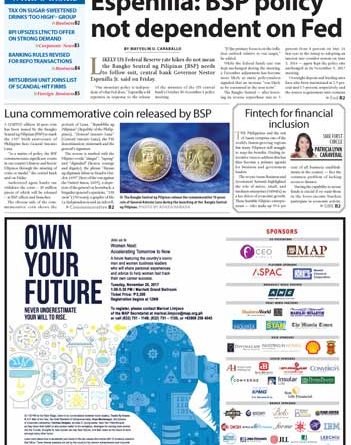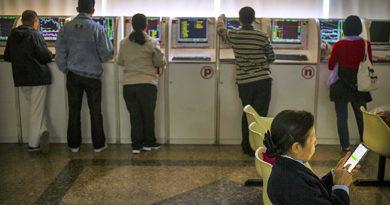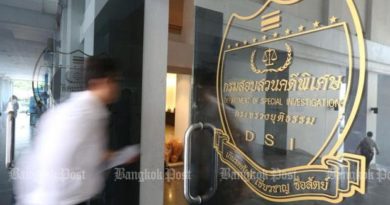Manila: Business – Espenilla: BSP policy not dependent on Fed
.
Likely US Federal Reserve rate hikes do not mean the Bangko Sentral ng Pilipinas (BSP) needs to follow suit, central bank Governor Nestor Espenilla Jr. said on Friday.
“Our monetary policy is independent of what Fed does,” Espenilla told reporters in response to the release of the minutes of the US central bank’s October 30-November 1 policy meeting.
“[O]ur primary focus is on the inflation outlook relative to our target,” he added.
While the federal funds rate was kept unchanged during the meeting, a December adjustment has become more likely as many policymakers signaled that an increase “was likely to be warranted in the near term”.
The Bangko Sentral — after lowering its reverse repurchase rate to 3 percent from 4 percent on May 16 last year in the runup to adopting an interest rate corridor system on June 3, 2016 — again kept the policy rate unchanged at its November 9, 2017 meeting.
Overnight deposit and lending rates have also been maintained at 2.5 percent and 3.5 percent, respectively, and the reserve requirement ratio remains at 20 percent.
Inflation forecasts for this year and 2018 were maintained during the November 9 meeting but the outlook for next year was raised given upside risks. Still, Espenilla said that future inflation was expected to stay within target.
“While inflation has trended higher due mainly to higher utility rates and fuel prices, latest forecasts continue to show the future inflation path staying within the government’s 3 percent plus or minus 1 percentage point target range for 2018-2019,” he said following the November meeting.
Given current conditions, Espenilla said that monetary authorities were of the view that prevailing monetary policy settings remained appropriate.
Earlier this week, Maybank Group Chief Economist Suhaimi Ilias said the Bangko Sentral could order a total 50-basis point (bps) hike next year, starting with a 25-bps adjustment during the third quarter.
“For the Philippines … there is need to manage … domestic macroeconomic issues, especially that the pressure of the peso has skewed to the situation that the current account has shifted from surplus to deficit as well effects of inflation, which is actually moving on an upward trend,” Ilias said.
A 50-bps increase in the first quarter of 2018, meanwhile, was forecast by Australia’s ANZ research last month.
Given the country’s current account deficit, ANZ said the peso could weaken past P52 to the dollar next year unless the BSP raises interest rates.
“Domestic interest rates are not high enough to attract sufficient foreign portfolio flows to fund the deficit,” ANZ said.
“If BSP does not hike rates as we expected, then [the]PHP may weaken more than our forecast next year,” it warned.
Courtesy: Business Times | By MAYVELIN U. CARABALLO, TMT on
.
NOTE : All photographs, news, editorials, opinions, information, data, others have been taken from the Internet ..aseanews.net | [email protected] |
For comments, Email to : Pahulu Gan – Contributor | [email protected]









